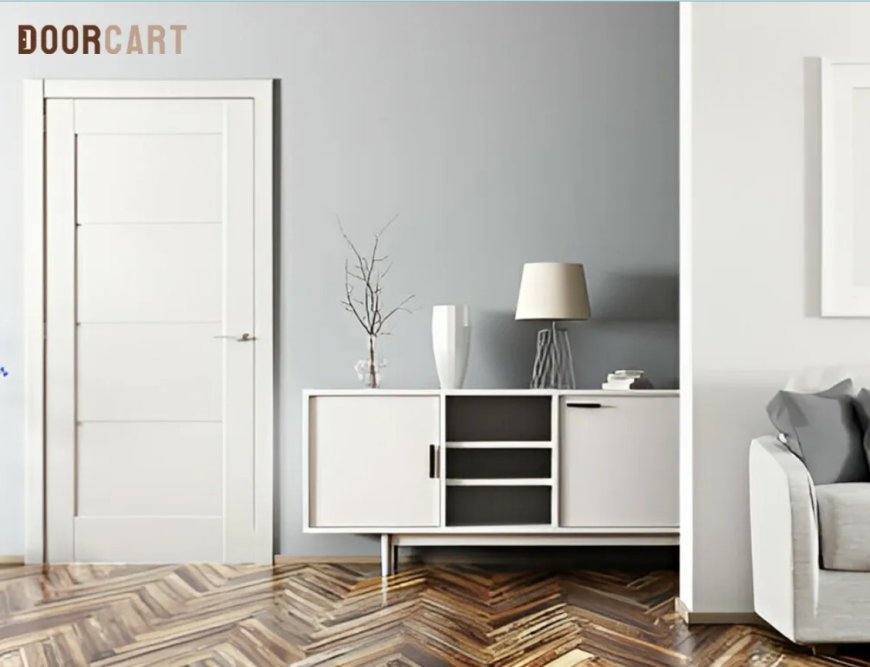Solid Core Interior Doors vs. Frosted Glass Doors: A Comprehensive Comparison

When choosing interior doors for your home or office, two popular options are solid core interior doors and frosted glass doors. Both have unique benefits in terms of aesthetics, functionality, and durability. In this blog, we’ll explore the features, pros and cons, and best applications for each type to help you make an informed decision.
1. Solid Core Interior Doors: Strength and Soundproofing
What Are Solid Core Interior Doors?
Solid core interior doors are constructed with a dense inner core, typically made of wood composite, particleboard, or fiberglass, and covered with a veneer or laminate finish. Unlike hollow-core doors, they offer superior durability, sound insulation, and security.
Advantages of Solid Core Interior Doors
1. Enhanced Durability
Solid core doors are heavier and more robust than hollow-core alternatives, making them resistant to dents, warping, and wear over time.
2. Superior Soundproofing
The dense core material significantly reduces noise transmission, making them ideal for bedrooms, home offices, and media rooms where privacy is essential.
3. Better Insulation
These doors provide improved thermal insulation, helping maintain consistent indoor temperatures and reducing energy costs.
4. Increased Security
Due to their sturdy construction, solid core doors offer better resistance to forced entry compared to hollow-core doors.
5. Aesthetic Versatility
Available in various finishes (wood, laminate, painted), they can complement both traditional and modern interior designs.
Disadvantages of Solid Core Interior Doors
-
Higher Cost: More expensive than hollow-core doors due to material density.
-
Heavier Weight: Requires stronger hinges and proper installation to prevent sagging.
-
Limited Glass Options: Most solid core doors do not incorporate glass panels, reducing natural light flow.
Best Applications for Solid Core Doors
-
Bedrooms
-
Home offices
-
Bathrooms (with proper sealing)
-
Media rooms
-
Entryways within the home
2. Frosted Glass Doors: Elegance and Light Diffusion
What Are Frosted Glass Doors?
Frosted glass doors feature glass panels treated with an acid-etched or sandblasted finish to create a translucent, semi-opaque appearance. They allow light to pass through while maintaining privacy.
Advantages of Frosted Glass Doors
1. Natural Light Enhancement
Frosted glass diffuses light, brightening interior spaces without the harsh glare of clear glass.
2. Privacy with Style
The frosted finish obscures visibility while still allowing silhouettes and light to pass through—ideal for bathrooms, conference rooms, and partition doors.
3. Modern Aesthetic Appeal
These doors add a sleek, contemporary look to any space, making them popular in offices and modern homes.
4. Customizable Designs
Frosted glass can be patterned, etched, or printed with decorative designs for a personalized touch.
5. Space Illusion
Glass doors create an open, airy feel, making small rooms appear larger.
Disadvantages of Frosted Glass Doors
-
Less Soundproofing: Glass does not block noise as effectively as solid core doors.
-
Higher Maintenance: Glass surfaces require regular cleaning to avoid smudges and fingerprints.
-
Fragility Risk: While tempered glass is durable, it can still crack or shatter under extreme impact.
-
Limited Privacy in Bright Light: In certain lighting conditions, shadows may become more visible.
Best Applications for Frosted Glass Doors
-
Bathrooms & showers
-
Office partitions & conference rooms
-
Closet doors
-
Kitchen pantries
-
Modern living room dividers
3. Solid Core vs. Frosted Glass Doors: Key Comparisons
| Feature | Solid Core Doors | Frosted Glass Doors |
|---|---|---|
| Durability | Highly durable, resistant to dents | Less impact-resistant (glass risk) |
| Soundproofing | Excellent | Minimal |
| Privacy | Full privacy | Semi-private (light diffusion) |
| Light Transmission | Blocks light | Allows natural light |
| Aesthetic Flexibility | Traditional/modern finishes | Sleek, contemporary look |
| Maintenance | Low maintenance | Requires frequent cleaning |
| Cost | Moderate to high | Moderate (varies by glass quality) |
| Best For | Bedrooms, offices, media rooms | Bathrooms, offices, modern interiors |
4. Which One Should You Choose?
Choose Solid Core Doors If:
✔ You need maximum sound insulation (e.g., bedrooms, offices).
✔ Durability and security are top priorities.
✔ You prefer a classic, solid-door appearance.
Choose Frosted Glass Doors If:
✔ You want to enhance natural light while maintaining privacy.
✔ Your design style leans modern or minimalist.
✔ The door is for a bathroom, partition, or decorative entryway.
5. Combining Both for Optimal Design
In some cases, a hybrid approach works best—for example:
-
Solid core doors with frosted glass inserts for a balance of privacy and light.
-
Frosted glass doors with solid wood frames for added stability.
This combination offers both functionality and aesthetic appeal.
6. Conclusion
Both solid core interior doors and frosted glass doors have distinct advantages depending on your needs. Solid core doors excel in durability, soundproofing, and security, while frosted glass doors enhance light flow and modern aesthetics.
Before making a decision, consider:
-
Room function (privacy vs. light needs)
-
Design preferences (traditional vs. contemporary)
-
Budget constraints
By evaluating these factors, you can select the perfect interior door to enhance your space’s functionality and style.



































































![https //g.co/recover for help [1-866-719-1006]](https://newsquo.com/uploads/images/202506/image_430x256_684949454da3e.jpg)






















![How Smart PMs Scale Their Careers in Any Org [TPG Live Recap]](https://tpgblog.com/wp-content/uploads/2025/06/2025-06-12-thumbnail-action.png?#)


















































